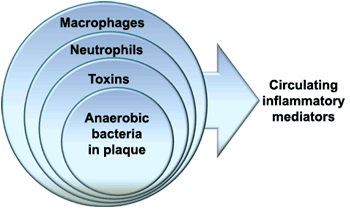The Role of Inflammation

Inflammation plays an increasingly recognized role in oral-systemic interaction.
What Causes Inflammation?
- Dental plaque is a polymicrobial biofilm that may contain 500 different species of bacteria.
- Some bacteria, particularly anaerobes, produce toxins that damage gum tissue.
- Neutrophils are white blood cells recruited to attack the bacteria. When there is gum damage, the immune system sends in macrophages to clean up cellular debris and dead and dying neutrophils.
- The macrophages secrete inflammatory mediators such as fatty acids, interleukin 1, and tumor necrosis factor that can circulate beyond the oral cavity.
- This inflammatory cascade and systemic spread of pro-inflammatory mediators is being studied to explain the observed link between oral disease and a wide range of systemic diseases.
Other Findings
- The role of inflammation in periodontal disease is illustrated by the finding that patients with rheumatoid arthritis who received anti-TNF therapy showed an improvement in periodontal health.
- In addition, periodontal treatment has been shown to reduce C-reactive protein, fibrinogen, and white blood cell counts in patients with or without coronary heart disease.
References
Mayer Y, Balbir-Gurman A, Machtei EE. Anti-Tumor Necrosis Factor-Alpha Therapy and Periodontal Parameters in Patients With Rheumatoid Arthritis J Periodontol 2009;80:1414-1420
Bokhari SAH, Khan AA, Tatakis DN, Azhar M, Hanif, M Izhar M. Non-Surgical Periodontal Therapy Lowers Serum Inflammatory Markers: A Pilot Study J Periodontol 2009;80:1574-1580.